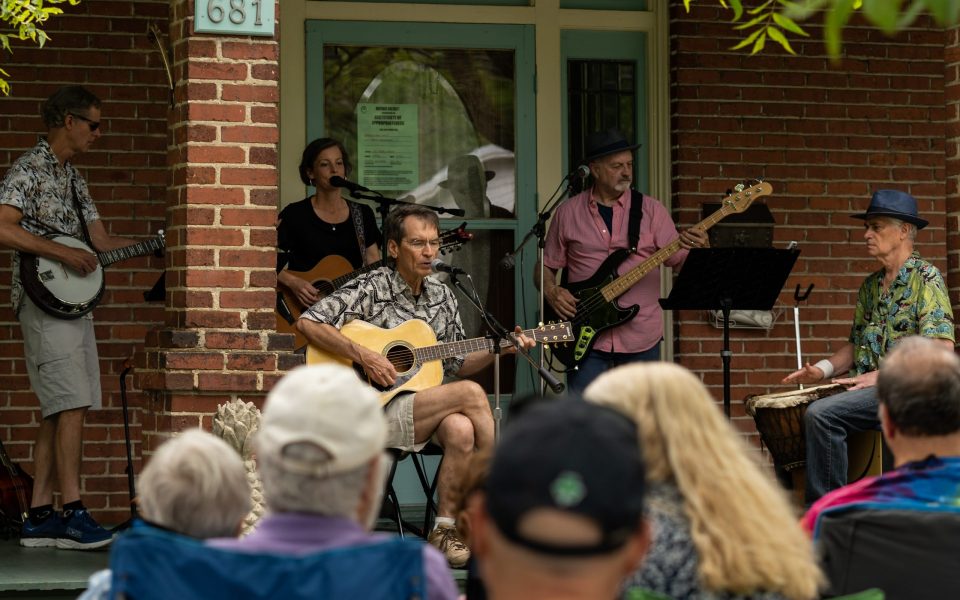On Cypress Street, Mason Jar Confessions performs original country tunes for a small crowd of local music-lovers. Down the block, acoustic duo Half-Baked Betty sings a series of rock songs. And just across Yanceyville Street, attendees of the Dunleath Porchfest enjoy the Minor Swing Band’s first performance since before the pandemic hit over a year before.
After COVID-19 shut down last year’s events, the Dunleath Porchfest returned this year with 43 different bands performing all over the historic neighborhood near downtown Greensboro. Every single one of these bands was wonderful, and it was amazing to see the community come out in such numbers now that vaccines are more widely available. For many of the musicians at Porchfest, it was their first time performing in front of a live audience since the pandemic began in March 2020.
And yet, all of the bands listed above were entirely white or white passing. The former two groups have one woman in them and few, if any, of those musicians appeared to be under the age of 40. And honestly, as I meandered from house to house, porch to porch, I had a hard time distinguishing between the acts.
Some acts stood out — Sabrina Petel, Emily Stewart and Kirby Heard come to mind — but we as a city can and should do better, especially after the events of 2020 in which a nationwide reckoning of violence against Black and brown bodies took place and a global pandemic disproportionately killed communities of color.
The history of the neighborhood brings the festival’s lack of diversity into much harsher light. Before the community was called Dunleath, it was named after Charles B. Aycock, a governor in the early 1900s, a fierce opponent of Reconstruction and an advocate for white supremacy.
Neighborhood residents petitioned to change the district’s name from Aycock to Dunleath in 2017. Centuries before that, Occaneechi and Siouan tribes lived in the area.
Still, it’s not enough to just change a name.
Solidarity and real equity comes from giving up space, paying artists and elevating communities that have historically been marginalized.
As a well-attended, annual community event, the Dunleath festival has the opportunity, or rather, the responsibility, to uplift those in our community that have been overlooked. Don’t forget, the city is half Black and the Dunleath neighborhood, which includes areas around Summit Avenue, is also home to Black residents. NC A&T University is just a block away.
In speaking with Porchfest organizer Lynne Leonard, she emphasized how much she and other organizers have pushed for diversity among their music acts, and that she has reached out to a number of folks personally. Every year, she says it is a goal of hers to bring more diverse acts to Dunleath’s porches-turned-stages.
While that’s great to hear, perhaps behind-the-scenes efforts like recruiting more organizers of color and expanding current organizers’ knowledge of Greensboro musicians should begin as early as now, a year out from the next Porchfest.
And as much as I enjoyed the festivities, I would be remiss not to note the lack of diversity, especially as Juneteenth draws near. Hopefully, those who enjoyed the music at Dunleath will come out to the events — such as Juneteenth GSO and the city’s day of celebration — with similar excitement.
Because ultimately, what we show up for and continue to support demonstrates its worth to the city and those in it. And if an event isn’t reflective of our city as a whole, it is up to us, particularly white people, to ask important questions and to demand change.
To view a full gallery of the event from this year, visit here.
Join the First Amendment Society, a membership that goes directly to funding TCB‘s newsroom.
We believe that reporting can save the world.
The TCB First Amendment Society recognizes the vital role of a free, unfettered press with a bundling of local experiences designed to build community, and unique engagements with our newsroom that will help you understand, and shape, local journalism’s critical role in uplifting the people in our cities.
All revenue goes directly into the newsroom as reporters’ salaries and freelance commissions.





Good article and point taken. Please refer any and all talent you have contact with. Our neighborhood is probably one of the more diverse (socioeconomic, racial, sexual orientation) in the city or even state. We cannot make bands apply so we featured those who made that choice. Like Lynn said, our goal is diversity. People have to join us in the effort.
Unpopular opinion for sure. Why judge folks by their seeming appearance not the content if their character and art? So sad your great paper has turned so far as to perpetuate and race bait when our city leaders and institutions laugh and consolidate power over all residents and murders are sky high. Too bad they didn’t have a n advertising budget like the other lily white festivals that are promoted by your advertisers.
I am sorry, what was the point of this? To complain that a music festival had a particular looking audience. Don’t know much about this festival, the author did not tell us about the history of it, but it appears to be a folk/Americana festival, maybe indie rock based on the one photo. There was no information about why the festival’s performers were mostly white and male, either by looking at the genre of music or the economics of touring right now. Instead blame it on individuals. All this really does is try and divide the working class up into camps based on race, gender, and whatever else and teaches us nothing. No plan or idea or hint of an idea how to fix this idea but we should feel bad that the diversity of this festival was limited, whatever type of festival it is. So this article taught us nothing but gets us to think about problems that might could be fixed in other ways, perhaps. Or you know maybe go to other festivals I don’t know…